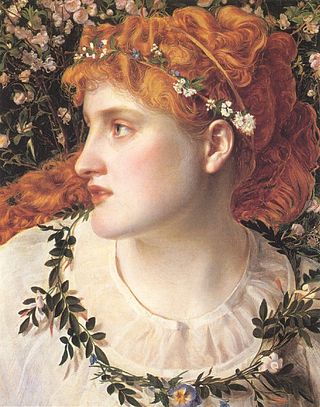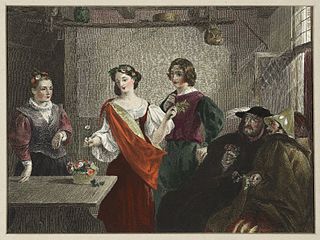
Cymbeline, also known as The Tragedie of Cymbeline or Cymbeline, King of Britain, is a play by William Shakespeare set in Ancient Britain and based on legends that formed part of the Matter of Britain concerning the early historical Celtic British King Cunobeline. Although it is listed as a tragedy in the First Folio, modern critics often classify Cymbeline as a romance or even a comedy. Like Othello and The Winter's Tale, it deals with the themes of innocence and jealousy. While the precise date of composition remains unknown, the play was certainly produced as early as 1611.

The late romances, often simply called the romances, are a grouping of William Shakespeare's last plays, comprising Pericles, Prince of Tyre; Cymbeline; The Winter's Tale; and The Tempest. The Two Noble Kinsmen, of which Shakespeare was co-author, is sometimes also included in the grouping. The term "romances" was first used for these late works in Edward Dowden's Shakspere (1877). Later writers have generally been content to adopt Dowden's term.

The Tragedy of King Lear, often shortened to King Lear, is a tragedy written by William Shakespeare. It is loosely based on the mythological Leir of Britain. King Lear, in preparation for his old age, divides his power and land between his daughters Goneril and Regan, who pay homage to gain favour, feigning love. The King's third daughter, Cordelia, is offered a third of his kingdom also, but refuses to be insincere in her praise and affection. She instead offers the respect of a daughter and is disowned by Lear who seeks flattery. Regan and Goneril subsequently break promises to host Lear and his entourage, so he opts to become homeless and destitute, and goes insane. The French King married to Cordelia then invades Britain to restore order and Lear's rule. In a subplot, Edmund, the illegitimate son of Gloucester, betrays his brother and father. Tragically, Lear, Cordelia and several other main characters die.

All's Well That Ends Well is a play by William Shakespeare, published in the First Folio in 1623, where it is listed among the comedies. There is a debate regarding the dating of the composition of the play, with possible dates ranging from 1598 to 1608.

The Winter's Tale is a play by William Shakespeare originally published in the First Folio of 1623. Although it was grouped among the comedies, many modern editors have relabelled the play as one of Shakespeare's late romances. Some critics consider it to be one of Shakespeare's "problem plays" because the first three acts are filled with intense psychological drama, while the last two acts are comic and supply a happy ending.

Elizabeth Stuart was Electress of the Palatinate and briefly Queen of Bohemia as the wife of Frederick V of the Palatinate. The couple's selection for the crown by the nobles of Bohemia was part of the political and religious turmoil setting off the Thirty Years' War. Since her husband's reign in Bohemia lasted over one winter, she is called "the Winter Queen".

The Merry Wives of Windsor or Sir John Falstaff and the Merry Wives of Windsor is a comedy by William Shakespeare first published in 1602, though believed to have been written in or before 1597. The Windsor of the play's title is a reference to the town of Windsor, also the location of Windsor Castle in Berkshire, England. Though nominally set in the reign of Henry IV or early in the reign of Henry V, the play makes no pretence to exist outside contemporary Elizabethan-era English middle-class life. It features the character Sir John Falstaff, the fat knight who had previously been featured in Henry IV, Part 1 and Part 2. It has been adapted for the opera at least ten times. The play is one of Shakespeare's lesser-regarded works among literary critics. Tradition has it that The Merry Wives of Windsor was written at the request of Queen Elizabeth I. After watching Henry IV, Part 1, she asked Shakespeare to write a play depicting Falstaff in love.

A Tale of Winter is a 1992 French drama film written and directed by Éric Rohmer, and starring Charlotte Véry, Frédéric van den Driessche, Hervé Furic and Michael Voletti. It is the second instalment in Rohmer's "Contes des quatre saisons" series, which also include A Tale of Springtime (1990), A Summer's Tale (1996) and Autumn Tale (1998). The film was entered into the 42nd Berlin International Film Festival.
A cup-bearer was historically an officer of high rank in royal courts, whose duty was to pour and serve the drinks at the royal table. On account of the constant fear of plots and intrigues, a person had to be regarded as thoroughly trustworthy to hold the position. He would guard against poison in the king's cup, and was sometimes required to swallow some of the drink before serving it. His confidential relations with the king often gave him a position of great influence.

Perdita is one of the heroines of William Shakespeare's play The Winter's Tale. She is the daughter of Leontes, King of Sicily, and his wife Hermione.

Florizel is a fictional character in Shakespeare's The Winter's Tale.
Pandosto: The Triumph of Time is a prose romance written by the English author Robert Greene, first published in 1588. A later edition of 1607 was re-titled Dorastus and Fawnia. Popular during the time of William Shakespeare, the work's plot was an inspiration for that of Shakespeare's play The Winter's Tale. Greene, in turn, may have based the work on The Clerk's Tale, one of The Canterbury Tales of Chaucer. Edward Chaney suggested that Robert Greene when writing Pandosto may have had in mind the Earl of Oxford's suspicions about the paternity of his daughter when he returned in 1576 from his continental tour that may have included Sicily.
Women in Shakespeare is a topic within the especially general discussion of Shakespeare's dramatic and poetic works. Main characters such as Dark Lady of the sonnets have elicited a substantial amount of criticism, which received added impetus during the second-wave feminism of the 1960s. A considerable number of book-length studies and academic articles investigate the topic, and several moons of Uranus are named after women in Shakespeare.
The Winter's Tale is a ballet in three acts choreographed by Christopher Wheeldon to a commissioned score by Joby Talbot. The ballet is based on the play of the same name by William Shakespeare. With scenery and costumes designed by Bob Crowley, lighting designed by Natasha Katz, and special stage effects designed by Daniel Brodie and Basil Twist, it was a co-production of the Royal Ballet and the National Ballet of Canada. It was first presented at the Royal Opera House, London, on 10 April 2014. The North American premiere occurred the following year.

The Winter's Tale is a 1910 American silent short drama produced by Thanhouser Company. The plot is an adaptation of The Winter's Tale by William Shakespeare and requires fore-knowledge of the plot in order to understand the condensed one reel work. The film focuses on the conflict arising from two Kings, one of Bohemia and one of Sicily, during a meeting. Queen Hermione enrages her jealous husband, Leontes, by entertaining Polixenes. Leontes decides to kill him with poison, but the plan is foiled by the courtier tasked with the assassination. For this, Leontes imprisons his wife. Hermione gives birth to a daughter and Leontes orders the baby to die out in the wilderness. Hermione is then brought before the court and apparently dies after interrogation. Fifteen years pass and Polixenes confronts and then secretly follows his son, appearing as he declares his intention to marry a shepherdess. The two lovers seek protection with Leontes, the King of Sicily. Mourning and repentant for his past actions, Leontes learns the shepherdess is his daughter and blesses the marriage of the lovers. The royal party goes to see a statue of the late queen Hermoine which is revealed to be alive. The cast includes Anna Rosemond, Frank H. Crane and Martin Faust, but the directorial and production credits for the film are unknown. The production was a success for the Thanhouser Company and the film was met with positive reception following its May 27, 1910 release. The film survives in the Library of Congress, but it is missing the final scene of the production. The surviving print suffers from significant deterioration.
Wintermärchen is an opera by Philippe Boesmans to a libretto by Luc Bondy and Marie-Louise Bischofberger after Shakespeare's The Winter's Tale. It was premiered on 10 December 1999 at La Monnaie in Brussels. The German premiere followed in 2001 at the Staatstheater Braunschweig.
The Winter's Tale is an opera in three acts by Ryan Wigglesworth. The libretto is by the composer, based on the play of the same name by William Shakespeare. The opera, in a production directed by Rory Kinnear, and conducted by the composer, was premiered at the English National Opera on 27 February 2017.












